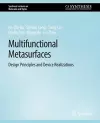
Multifunctional Metasurfaces
6 authors - Paperback
£49.99
He-Xiu Xu received his Ph.D. in Electronic Science and Technology from the Air Force En gineering University, China, in 2014. From 2015–2017, he was a postdoctoral fellow of the Physics Department at Fudan University (Shanghai, China). In 2017–2018, he was a visiting scholar in the Department of Electrical and Computer Engineering of the National University of Singapore. He joined the Department of Electronic Science and Technology of Air Force Engineering University in 2014 as an assistant professor, became an associate professor in 2016, and is now a full professor since 2019. He has been working in the fields of metamaterials, metasurfaces, and their potential applications in circuits and functional devices, and has published more than 120 papers in scientific journals. He was elected as a fellow of The Institution of Engineering and Technology (IET) in 2019.Shiwei Tang received his Ph.D. in the Physics Department of Fudan University, Shanghai, China, in 2014. He was a postdoctoral fellow in the Materials Science Department of Fudan University from 2014–2015. He joined Ningbo University, Ningbo, China in 2016 and was promoted to an Associate Professor in 2019. His current research interests include metamaterials/metasurfaces, microcavities, plasmonics, and nanophotonics. He has published over 60 papers in journals such as Advanced Materials, Advanced Functional Materials, ACS Nano, and Optics Express.Tong Cai received the B.S. and Ph.D. in Electrical Engineering from the Air Force Engineering University, Xi'an, China, in 2012, and 2017, respectively. He was with Fudan University as a visiting scholar from 2015–2017. He was with the Air Force Engineering University, where he became a Lecturer in 2017 and an associate professor in 2020, and has been a Post-Doctoral Researcher with Zhejiang University since 2019. His research interests include metamaterials, metasurfaces, and their applications to novel antennas and multifunctional devices. He obtained the support of the Postdoctoral Innovation Talents Support Program of China in 2019. He has authored over 40 peer-reviewed first author articles in journals such as Advanced Photonics, Advanced Optical Materials, IEEE Transactions on Antennas and Propagations, and Physical Review Applied.Shulin Sun received his Ph.D. in Physics at Fudan University in 2009. From 2010–2013, he was a Postdoctoral Fellow of the Department of Physics at National Taiwan University. In 2013, he joined the Department of Optical Science and Engineering at Fudan University, and has been a full Professor and associate dean of the department since 2019. He has been working in the fields of metamaterials/metasurfaces, plasmonics, and photonic crystals, and published over 70 papers in journals such as Nature Materials, Nano Letters, Advances in Optics and Photonics, and Light: Science & Applications.Qiong He received his Ph.D. degree in Physics from the Paris Institute of Optics in Paris-Sud University (Orsay, France) in 2008. From 2009–2013, he was a postdoctoral fellow in the Physics Department of Fudan University. He is currently an associate professor in the Physics Department of Fudan University (Shanghai, China). His research interests focus on metamaterials and plasmonics. He has coauthored more than 80 publications in scientific journals, including Nature Materials, Physics Review X, Physics Review Letters, Advances in Optics and Photonics, Light: Science & Applications, and Nano Letters.Lei Zhou received his Ph.D. in Physics from Fudan University, China, in 1997. From 1997– 2000, he was a postdoctoral fellow of the Institute for Material Research at Tohoku University (Sendai, Japan). In 2000–2004, he was a visiting scholar in the Physics Department of the Hong Kong University of Science and Technology. He joined the Physics Department of Fudan University in 2004 as a professor, became a “Xi-De” chair professor in 2013, and is now Chair of the department. He has been working in the fields of magnetism, metamaterials, photonic crystals, and plasmonics, and has published more than 180 papers in scientific journals. He was elected as a fellow of The Optical Society (OSA) in 2019, and a Clarivate Analytics Global Highly Cited Researcher (2019–2020).